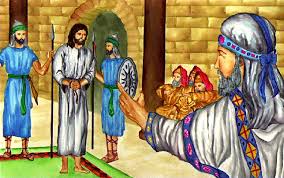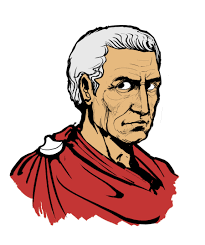John 19:1 – Then Pilate took Jesus and flogged him.

As we saw in chapter 18, rage and jealousy had driven the Jewish religious leaders to the point where they would stop at nothing to have Jesus crucified by the Romans. So they dragged Jesus to Pilate's judgment hall and accused him of rebellion against Caesar.
But Pilate won't just 'rubber stamp' this execution. He isn't stupid or uninformed of what is taking place in the city. He is well aware that the religious leaders have arrested Jesus because they are jealous of him (Matthew 27:18). Therefore, he conducts his own investigation and concludes that Jesus is innocent; he posed no threat to the rule of Caesar or the authority of Rome.
In addition to being convinced that Jesus was innocent, Pilate had been warned by his wife not to mess with Jesus:
Matthew 27:19 - When he was sat down on the judgment seat, his wife sent unto him, saying, Have nothing to do with that just man: for I have suffered many things this day in a dream because of him.
At this point, Pilate is becoming uneasy; his conscience is bothering him. He is slowly losing control of this situation. He must maintain peace in the city, but he is also desperately seeking a way to release Jesus, because in his heart Pilate knows he is innocent. Subsequently, Pilate placed both Jesus and the notorious criminal Barabbas before the crowd believing they would chose to have Jesus released to them.
But he was wrong – at the insistence of the religious leaders, the mob called for Barabbas to be set free while they clamored for the crucifixion of Christ.
It is interesting to note that Pilate, a Gentile/pagan, absolves Jesus by the evidence before him and seeks to set him free while the Jews who heard his doctrine, saw his miracles, and were looking for the Messiah, seek to condemn him.
At this point, Pilate orders that Jesus be scourged/whipped.
Public whipping was a common form of punishment back in that day; even the Jews used it. According to the Law, the Jews could never give a person more than 40 lashes (Deuteronomy 25:3). In order to ensure that they never broke this law, the Jews limited each whipping to a maximum of 39 stripes (II Corinthians 11:24).
But the Romans, who were the ones scourging Jesus, had no such limitation. It was their custom to savagely flog prisoners before they were crucified and there is no reason to think that they showed any mercy to Christ.
The torture that Jesus endured during this whipping was all part of the payment for our sin. He was well aware that he was going to endure this pain and suffering (Matthew 20:19, Luke 18:33, etc). But he still willingly endured it in order to save us.
Isaiah 50:6 - I gave my back to the smiters, and my cheeks to them that plucked out the beard: I hid not my face from shame and spitting.
In addition, God informs us that this punishment fulfilled a specific purpose – it provided healing for us:
Isaiah 53:5 - But he was wounded for our transgressions, he was bruised for our iniquities: the chastisement of our peace was upon him; and with his stripes we are healed.
Many people interpret this to mean healing from physical sickness and disease – and they would be right. It definitely covers that. But it is wrong to limit our healing to just physical ailments. The stripes of Jesus also provide healing for our minds, our emotions, our relationships, and anything else in our lives that is broken.
What parts of your life need healing? I urge you to bring them to God and ask him to intervene; the price for your healing has already been paid by our Lord and Savior.
Now, let's ask ourselves this question: What was Pilate's motive in having Jesus punished this way?
Scholars speculate that he was hoping to pacify the anger of the Jews so that he could dismiss the charges against Jesus and let him go (Luke 23:16). But that was not God's plan.
John 19:2-3 – And the soldiers twisted together a crown of thorns and put it on his head and arrayed him in a purples robe. They came up to him, saying, "Hail, King of the Jews!"
At this time in history, the Roman Empire ruled the world. So when the soldiers hear that Jesus is a king, it ignites feelings of scorn and mockery. In their opinion, no one had even the slightest chance of destroying the empire or defeating Caesar. And this certainly included the meek, unassuming man standing bound before them in the judgment hall.
Their contempt for Jesus manifested itself in the form of ridicule. Since Jesus claimed to be king, they would make him one!

Taking a mass of needle-sharp thorns, they twisted them into a crown and shoved it down on Jesus' head. The thorns pierced his skin and he bled heavily from these wounds.
Although John does not mention it, the other gospels tell us that the soldiers also placed a weed in the right hand of Jesus, to represent a scepter:
Matthew 27:29 -And when they had platted a crown of thorns, they put it upon his head, and a reed in his right hand: and they bowed the knee before him, and mocked him, saying, Hail, King of the Jews!
Their representation of Jesus as king was completed with some kind of a ragged purple robe. Once he was arrayed like this, they taunted and jeered at him by bowing down and acknowledging him as a king. They spit on him, mocked him, hit him in the face and plucked out parts of his beard.
Mark 14:65 - And some began to spit on him, and to cover his face, and to buffet him, and to say unto him, Prophesy: and the guards did strike him with the palms of their hands.
Mark 15:19 - And they struck him on the head with a reed, and did spit upon him, and bowing their knees worshiped him.
These men 'made sport' with Jesus, just as the Philistines did to Sampson (Judges 16:23-25). As they were cruelly abusing our Lord and Savior, Pilate was still trying to think of a way to escape judging Jesus. Once he finds out that Jesus is from Galilee (Luke 23:6-7) he came up with the idea of sending him to Herod. But that backfired on him as well; after Herod and his men further vilify Jesus, Herod returns him to Pilate:
Luke 23:11 - And Herod with his men of war despised him, and mocked him, and arrayed him in a gorgeous robe, and sent him again to Pilate.
We now see how cowardly, base and cruel Pilate really is. He believes Jesus is an innocent man, yet:
- He has Jesus publicly whipped.
- He allows the soldiers under his command to dishonor, abuse and mistreat him.
- He makes a friend and ally of Herod by allowing him and his men to do the same.
- He will shortly surrender Jesus to death, in order to keep the favor of the Jews.
John 19:4-5 – Pilate went out again and said to them, "See, I am bringing him out to you that you may know that I find no guilt in him." So Jesus came out, wearing the crown of thorns and the purple robe. Pilate said to them, "Behold the man!"
Having scourged and abused the prisoner, Pilate now brings him outside and displays him to the religious leaders and common people.
Now that Pilate has publicly profaned and debased Jesus, it was doubtful that masses of people would continue to revere and follow him. This should have alleviated the hatred/envy of the Pharisees. In addition, Pilate again reiterates that he finds Jesus innocent of all charges. His hope is that the Jews would be satisfied with the extreme punishment Jesus had already endured and drop the charges against him.
 If so, Pilate would also benefit – he would be relieved of the responsibility of judging Jesus.
If so, Pilate would also benefit – he would be relieved of the responsibility of judging Jesus.Pilate intended the stripes of Jesus to be a never ending reproach/disgrace that would remain with him until he faded into the obscurity of history. Little did he know that these same stripes would cause Christians to revere, love and adore the Son of God for eternity!
John 19:6 – When the chief priests and the officers saw him, they cried out, "Crucify him, crucify him!" Pilate said to them, "Take him yourselves and crucify him, for I find no guilt in him."
But this did not satisfy the fury and indignation of the Jewish officials. Indeed, it only seemed to aggravate them even more. Notice how unreasonable the chief priests and officers have become:
- Even though Pilate finds Jesus innocent of the charges, they refuse to accept his findings. They also refuse to furnish further proof of their accusations and they have no other charges to bring against him.
- They will not be satisfied with the extremity of the punishment Jesus has already endured, even though he is innocent.
- They do not allow mercy, compassion or justice to influence their actions.
- They were willing to risk their own safety to see Jesus destroyed - if they stirred up a mob and a rebellion ensued, the Jews would be slaughtered by Rome.
It was their utter contempt and blind hatred of Jesus which caused them to cry out "Crucify him!"
At this point, Pilate gives them one last chance to check their fury and change the course of the proceedings. He pauses and once again insists that Jesus is innocent of all charges; he ironically commands the Jews to crucify Jesus themselves.
John 19:7 – The Jews answered him, "We have a law, and according to that law he ought to die because he has made himself the Son of God."
And now we see what truly lies in the hearts of the Jews (Luke 6:45).
The Law was one of the most important aspects of Jewish life. And well it should be - the Law was the covenant between Israel and God; it was an agreement that no other nation had. It set the Jews apart as God's chosen people.

However, over time the Law became a source of national pride. The Jews boasted in having it, but they dishonored God by breaking it (Romans 2:23-24). For instance, we saw that the Jews refused to enter into Pilate's judgment hall on the eve of Passover because they did not want to do anything that would make them ceremonially unclean, but their reason for being there in the first place was to murder an innocent man.
Scripture also gives us the example of the Pharisees who were so eager to obey the letter of the law that they tithed on the herbs growing in their gardens, but they ignored issues of justice and mercy:
Luke 11:42 -But woe unto you, Pharisees! for you tithe mint and rue and all manner of herbs, and pass over justice and the love of God: these ought you to have done, and not to leave the other undone.
In the current situation, the religious leaders refer to a portion of the Law which dictates that anyone guilty of blasphemy should be put to death (Leviticus 24:16). Falsely claiming to be the Son of God definitely counts as blasphemy, and this is what they were accusing Jesus of doing.
But just as in the prior examples, they once again attempt to keep the letter of the law while ignoring the obvious will of God.
The Jews failed to fairly and impartially study the claim of Jesus. If they had, they would have realized that the scope of his doctrine did not draw people away from God; it drew them closer to him. He was not abolishing the Law, he was fulfilling it. Furthermore, if Jesus confirmed his mission and doctrine by miracles (which he certainly did), then by Law, they should have listened to him:
Deuteronomy 18:18-19 - I will raise them up a Prophet from among their brethren, like unto you, and will put my words in his mouth; and he shall speak unto them all that I shall command him. And it shall come to pass, that whosoever will not hearken unto my words which he shall speak in my name, I will require it of him.
So, although the Jewish leaders sound very 'religious', they actually perverted the Law and used it as a tool to murder an innocent man.
John 19:8 – When Pilate heard this statement, he was even more afraid.
Meanwhile, Pilate's day is going from bad to worse. When he understood that his prisoner was claiming not only royalty, but deity, he became seriously afraid. The alarm bells of his conscience were now ringing at full volume!
John does not tell us exactly what was causing this fear, but it may well have been the possibility of vengeance. The Romans were polytheistic, which means they worshiped multiple gods. They believed that it was possible for the offspring of gods to visit mortals and thus Pilate was afraid to condemn Jesus and offend one of the supreme deities, who would later take vengeance upon him.
So Pilate is contending with his own conscience, plus the possibility of vengeance from a 'god', plus the huge crowd of Jews who are all stirred up and ready to cause a riot in the city. With all this going on, it was no wonder he was experiencing fear! It must have seemed as if things were quickly spiraling out of control.
Based on this new charge from the Jewish leaders, Pilate returns to the judgment hall to further question Jesus.
John 19:9 - He entered his headquarters again and said to Jesus, "Where are you from?" But Jesus gave him no answer.
Pilate is now in a state of anguish. What has he gotten himself into? Should he follow his conscience and acquit Jesus of all charges, risking a full scale riot in Jerusalem? Or should he bow to the demands of the unpredictable Jews? Is Jesus a demigod? If so, what punishment will he suffer for crucifying him?
In a desperate effort to find an answer, Pilate returns to Jesus and asks 'where are you from'? Of course, Pilate couldn't care less where Jesus was born; he is asking Jesus if he was a mere human born on earth or if he was a divine being. (Keep in mind, Pilate has no real understanding of the One True God which we serve and his only begotten Son. Pilate is thinking of demigods in the way of the pagans.)
Jesus, however, remains steadfastly silent. Many explanations have been offered to account for this.
 One explanation says this: Jesus was silent because he was not there to plead the truth of his case and receive mercy. He was there to be condemned and suffer on our behalf so that we could be forgiven of sin.
One explanation says this: Jesus was silent because he was not there to plead the truth of his case and receive mercy. He was there to be condemned and suffer on our behalf so that we could be forgiven of sin.Another says this: Jesus had already given Pilate the answer to this in verse 37, when he explained that he was a king, but not a king of this world. Since Pilate could not receive the truth of that concept, neither would he understand the answer to the current question.
1 Corinthians 2:14 -But the natural man receives not the things of the Spirit of God: for they are foolishness unto him: neither can he know them, because they are spiritually discerned.
Yet another says this: Although Pilate was still debating with himself, Jesus knew that the final outcome was crucifixion. Having already made a reasonable defense for himself, he sees no point in continuing the conversation. Instead, he yields to death on the cross.
Why do you think Jesus remained silent before Pilate?
John 19:10 – So Pilate said to him, "You will not speak to me? Do you not know that I have authority to release you and authority to crucify you?"
Pilate seems to have forgotten the fear that just gripped him moments ago. His pride is offended because Jesus will not answer him and he becomes angry. He insinuates that since Jesus refuses to speak when spoken to, he is showing disrespect to those in authority.
What a laughable thought! Pilate boasts of his own authority as if the world hung upon his every decision. What he doesn't know is that God has put all power and all authority into the hands of Jesus – the very man standing before him! In fact, everything and everyone is subject to him:
Ephesians 1:22 -And has put all things under his [Jesus'] feet, and gave him to be the head over all things to the church,
(See also I Corinthians 15:25-27, Hebrews 2:8). If we ever find ourselves in a position of authority, let us take this to heart: Just like Pilate, we have no power and no authority that is not given to us by God, so we have no reason to boast!
John 19:11 – Jesus answered him, "You would have no authority over me at all unless it had been given you from above. Therefore, he who delivered me over to you has the greater sin."
The statement of Jesus that Pilate's power had been given to him 'from above' can be understood in two ways.
First, it could refer to Pilate's official office/job which was that of a magistrate/judge. All civil power is both ordained and limited by God (Romans 13:1). In other words, the only reason the governor of Judea had the authority to judge/decide criminal cases, was because God sanctioned it. So, the authority of the governor (whoever that might be) to release or crucify prisoners came 'from above' by the hand of God.
In this particular case, God allowed Pilate to wield the authority of this office.
Secondly, everything that happened to Jesus had been predetermined in the eternal councils of God before the world began (I Peter 1:18-20). Since God had determined that the Messiah was required to sacrifice his life for our sin, Pilate was given the authority 'from above' to sentence Jesus to death by crucifixion.
The opposite is also true. If Father God had determined that his Son did not need to die, then Pilate would not have been able to crucify him. God was fully in charge of this situation; he was not at the mercy of Pilate.
Both cases show us that Pilate did not have as much power as he thought he had; although he had a free will choice, he had to work under the limits God had determined before he was ever born.
Jesus then goes on to discuss culpability.
In Luke chapter 12, Jesus tells a parable about a house owner who goes on a trip and leaves his servants to manage the property while he is gone. The servants who do a good job have nothing to fear when the owner returns. They will be rewarded for good service.
However, the wicked servants will be punished. Those who were ignorant of the master's will receive a few stripes for wrong doing, while those who were fully aware of the master's will but chose not to do it are beaten with many stripes. The bottom line is that to whom much is given, much is required:
Luke 12:47-48 - And that servant who knew his master's will but did not get ready or act according to his will, will receive a severe beating. But the one who did not know and did what deserved a beating will receive a light beating. Everyone to whom much was given, of him much will be required, and from him to whom they entrusted much, they will demand the more.
This spiritual principle applies to the case of Pilate and the Jews. Pilate was certainly guilty of wrong doing. He was fully convinced that Jesus was an innocent man, yet he allowed him to be severely beaten, mocked and abused. He then shipped him off to Herod for more of the same. But Pilate is not a Jew. He does not have an understanding of the law. He does not realize that there is only one God and Jesus is his Son, the Messiah. Consequently, his sin is less than that of the religious leaders.
Meanwhile Judas, who delivered Jesus to the Jewish high priest, and the Jewish leaders who delivered Jesus to Pilate (especially Caiaphas), have a much greater culpability because they knew the law. They had access to the Old Testament scriptures. They professed to be experts at interpreting the law. They knew the Messiah was coming. They knew his work would be confirmed with signs and wonders.
Despite knowing God's will and plans, they conspired to murder the Messiah - an innocent man. They had Jesus arrested and brought to the Romans under false charges.
They intimidated Pilate. They produced false witnesses. They incited the crowd to have Barabbas released and Jesus crucified. Therefore, their sin is greater than that of Pilate.
John 19:12 – From then on Pilate sought to release him, but the Jews cried out, "If you release this man, you are not Caesar's friend. Everyone who makes himself a king opposes Caesar."
This case is not turning out to be the slam-dunk the Jewish officials were hoping for. Pilate is very unwilling to simply condemn Jesus and move on. The possibility that Jesus may be released only fills the Jews with more hate and determination. They have come this far and they will accept nothing less than the death of Jesus, no matter what they have to do. So they 'up the ante' on Pilate.
Having worked themselves into a frenzy, they once again throw charges of sedition into the mix, but now they are not just leveling this charge against Jesus – they are insinuating that Pilate is guilty of rebellion against Rome as well. In effect, they are bullying Pilate!
Given the political climate of that day, this was a very effective tactic.

Rome was actually ruled by emperors. However, after the reign of Julius Caesar, all the emperors assumed the title of Caesar, just as all the kings of Egypt assumed the title of Pharaoh.
At the time of Christ, the reigning emperor was Tiberius (Luke 3:1). He was one of the most cruel and wicked men to ever rule Rome. If he heard so much as a rumor that Pilate was undermining his power, Pilate could look forward to a slow, tortured and painful death. It would be natural for Pilate to fear retribution from him.
The threats of the Jews have hit their mark. The defining moment of Pilate's life has now come - he must make a decision regarding Jesus.
He can either follow his conscience and do the right thing or throw Jesus under the bus in an effort to keep peace and protect himself. Sadly, he fails to do what is right.
Let me offer you some encouragement:
As we noted in today's study, Jesus endured unspeakable pain and suffering so that we could be reconciled to God. In light of this, how could we ever question his love for us?
I know that all of us go through tough times. Occasionally we wonder if God has forgotten or abandoned us, but let me set the record straight: HE HAS NOT!
God assures us that he will be with us until the end of this age (Matthew 28:20). He repeatedly tells us to stand strong and fear not (Genesis 15:1, Psalms 46:1-3). He says that all things work together for our good (Romans 8:28).
So the next time Satan tries to whisper in your ear that God doesn't care about you, encourage yourself by remembering the cross!
Let me offer you some relief:
Pilate sinned in some really ugly ways and so did the religious leaders of that day. But before we cast any stones, we should keep in mind that we too are guilty of sin, which separated us from the love of God.
But there is good news – Jesus has provided relief from our sin. Because of the cross we can be forgiven and restored into a relationship with Father God.
Let me offer you some strength:
How is your relationship with God today? Is it the strong and vibrant relationship you wanted? Or has God been pushed aside in the busyness of your everyday life? Is it possible that you are reading this post, yet you have never actually asked Christ to forgive you of your sin? If so, you can come to cross right now, and find restoration and forgiveness by praying this prayer:
Dear Jesus, I confess to you that I am a sinner. I am sorry for all the wrong things I have done and I ask you to forgive me. I believe that you are the Son of God, that you died on the cross and rose again, and that your blood paid the price for my sin. I invite you to come into my heart and life and to be my Lord and Savior. I commit myself to you right now. Thank you for saving me from death and giving me the gift of eternal life. Amen.
If you prayed this prayer and sincerely meant it, then you have received the gift of salvation from Jesus Christ!
